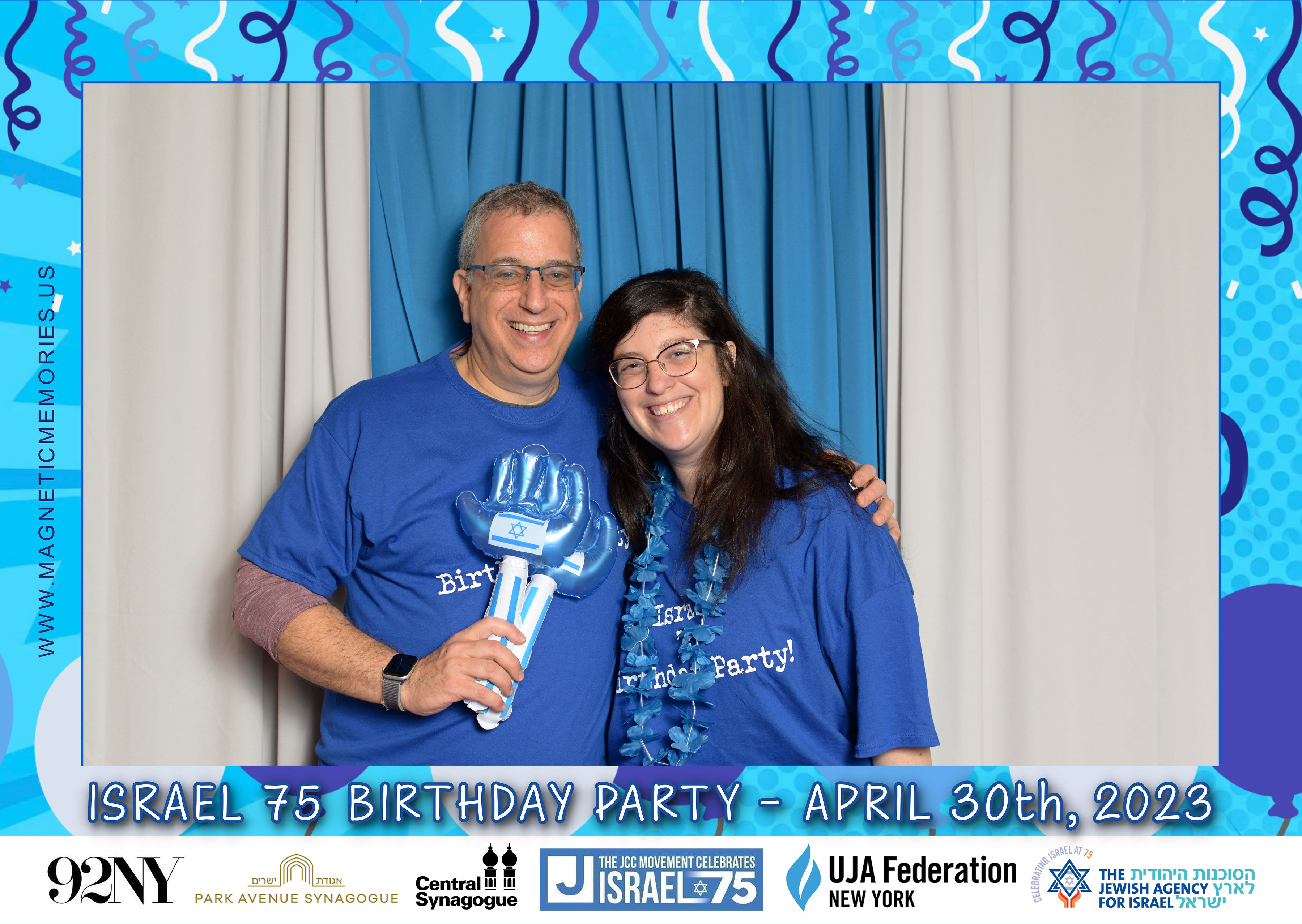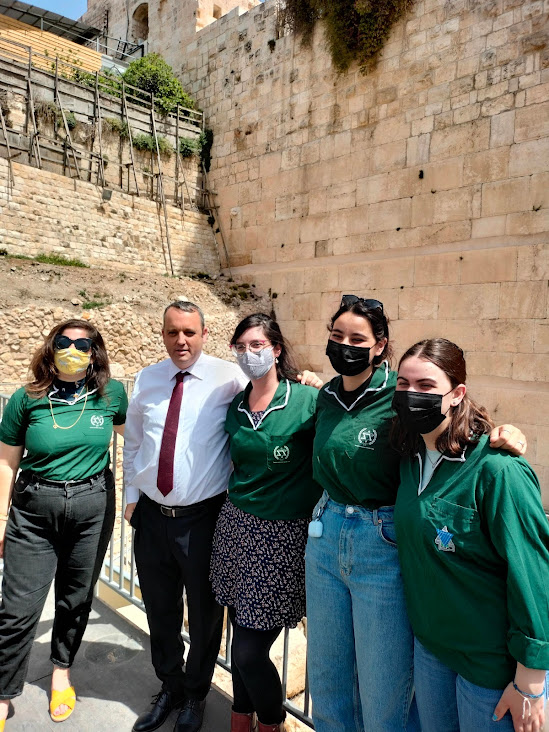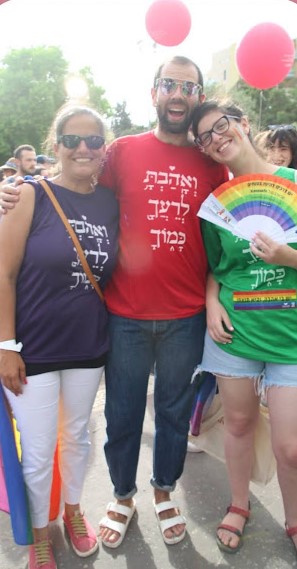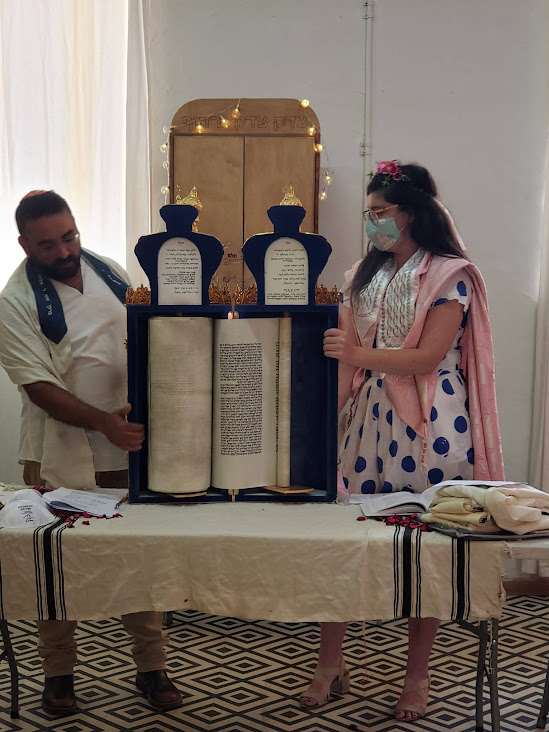News
News
Israel @ 75: Meet Upper East Side Shlicha Michal Abramoff
May 17, 2023 | General News | Programs and Events
Say "shalom” to Michal Abramoff, a Central staff member. She serves as our Upper East Side shlicha (Israel emissary). As we mark Israel’s 75th birthday, Michal sat down with Central Synagogue to talk about her Jewish journey, the beauty and complexity of the Jewish State, the many ways American Jews can form authentic and personal connections to Israel, and what she hopes to learn about the Central community.
CENTRAL: First thing’s first. What is a “shlicha?”
MICHAL: The word shlicha comes from the word shlichot, which doesn't really translate well to English. The word we normally use is “Emissary.” It's basically a person sent on a mission, but they’re not a missionary. But the basic idea is connecting Israel and Jewish communities around the world.
CENTRAL: What is your relationship to Israel?
MICHAL: I was actually born in New York on the Upper East Side. My mom is American and my dad is Israeli. When I was two, we made aliyah (which is when Jewish people move to Israel) and I grew up in Tel Aviv.
CENTRAL: What do you love most about Israel?
MICHAL: Israel is a place where I can be Jewish freely, it's a place where there are different kinds of Jews that I can meet and interact with. Sometimes we take it for granted in Israel, but our school year, our vacations, everything is built around the Jewish calendar. Pretty much everyone you meet on the street is most likely Jewish. No one thinks my name is weird, which happens to me a lot in America.
But I think Israel is more than that. It’s the idea of having a Jewish country, a place that Jewish people can call home, and a safe haven for Jewish people. And it’s just such a beautiful country. I mean, it has everything: beaches, deserts, mountains – it even has one mountain with snow. It’s everything.
CENTRAL: What made you want to become a shlicha?
MICHAL: This is actually my third time doing this. The first time, I was an Israeli counselor a camp in Massachusetts called Pembroke, which was a non-affiliated but Reform-style camp. It was right after I served in the military and I was looking for something to do. I was an art counselor, and it was just so much fun and so great. It was also my first experience reading Torah, so it was a very significant Jewish experience for me as well.
When I came back to Israel, I did my undergrad but knew I wanted to take a break before going to graduate school. I was a shlicha for two years at the Jewish Community Center in Hartford, Connecticut. It was honestly a life-changing experience for me. To suddenly be a full-time Jewish professional – to even realize that there is such a profession as a Jewish professional—because in Israel everyone's Jewish.
CENTRAL: Everyone’s sort of a Jewish professional by default.
MICHAL: Right! And it was incredible to build relationships and do community organizing, all through a Jewish and Israeli lens. I remember during my first year there, I was gathering all the different synagogues to talk about Yom Ha’Atzmauut (Israel's Independence Day). And I was sitting with Reconstructionist, Reform, Conservative, and ultra-Orthodox Jewish people, everyone sat together around the table, and we all could agree on this one big event around Israel. And I was like, this is beautiful. Why don't we have this in Israel?
I returned to Israel with the purpose of being a Jewish professional and bringing Jewish pluralism to Israel, which is how I found the Reform Movement in Israel and started working for them. I also wanted to maintain this bridge between Israeli Judaism and world Jewry. I feel like after five years in Israel working for the Reform Movement, I have so much more to bring back now to the bridge that I'm building. That’s why I'm here a third time. And to be able to come back to the Jewish communities on the Upper East Side – congregations that, if I hadn’t made aliyah, would have been my community – is just an extra amazing layer.
CENTRAL: Why do you feel it's important for Jewish people in the Diaspora to connect with Israel?
MICHAL: I think it's a question a lot of people are asking right now, especially with everything that's happening in Israel. But when I really think about it, I think there are a lot of reasons why feeling connected with Israel is important.
There's the tradition part of it, there's the history, part of it, the ancestry part of it, and I think those are super important. I've had experiences where I’ve walked in the path of our ancestors Abraham and Sarah and Isaac. I've been to different archeological sites where you can really see the history of our people in the connection to the land itself. I also think the idea of Jewish sovereignty, and the idea of having a place where – ideally – all Jews are welcome is important.
I'm not here also to give you a certain specific connection, like “You have to love Israel.” I just want you to have a connection to Israel, learn about Israel, and explore how Israel is a part of your identity – because it is. I want Central members to be able to sit down together and have an honest conversation about Israel, even though they may have different opinions.
CENTRAL: So switching gears a little bit, we’re in the midst of marking Israel’s 75th anniversary. Is there any Israel @ 75 programming planned with Central and the Upper East Side Jewish community that people should watch out for?
MICHAL: (laughter) Oh, my God, there's so much programming happening, I think maybe we overdid it a little! Because Central is such a big community, we want to make sure that there is something for everyone. If you missed any of our Israel @ 75 programming so far, you can watch the recordings.
We're really looking at a season of Israel @ 75, and we’re trying to bring as many viewpoints on Israel as possible so everyone can engage in various ways throughout the year. In June, we’ll have “Breakfast With Israeli Women,” where we’ll hear from different Israeli women who are active in the Reform movement, and we’ll also be marching together in the Israel Day Parade. There’s so much more to come; please go to the Central Synagogue website to stay up to date.
CENTRAL: Is there anything that’s surprised you during your time at Central?
MICHAL: I'm very surprised by how much people genuinely want to engage with Israel. I see it in the different departments at Central, who are all really interested in seeing how we can have these complex conversations and find different perspectives on various topics.
As Israelis, a lot of the time we think or we are told that Jewish Americans don't really care about Israel, or that it's usually the extreme left who are anti-Israel and the extreme right who are very pro-Israel, that kind of thing. There are a lot of stereotypes that are just not true. In reality, there's so much more in the middle. I love meeting that middle and I love having those conversations. So I don't know if I would say it surprises me as much as it excites me!
CENTRAL: If there was one thing you wanted American Jews to understand about Israel, what would that be?
MICHAL: I think the one thing I want people to know about Israel is that it isn’t one thing. It's not the Israel you read in the Bible. It's not the Israel you hear on the news. It's not the Israeli government. It's not a far-away foreign concept. It's a very diverse country with a mixture of different interpretations of Judaism. Israel isn’t one thing; it’s many, many things.
CENTRAL: And now, to ask the same question in reverse: If there was one thing you wanted Israeli Jews to know about American Jews, what would that be?
MICHAL: I think Israeli Jews don't understand what it's like to be Jewish outside of Israel. There's just something so beautiful about the ways that Judaism has evolved and adapted in the U.S. It’s very important to American Jews to express their Jewish heritage and identity by being a part of the Jewish community. I think that's something that Israelis take for granted. We're not in search of Jewish community.
CENTRAL: Because unlike Jews in America, Israeli Jews aren’t a minority within their country.
MICHAL: Yes, exactly. Experiencing American Judaism made me go on my own journey to find and evolve my Jewish identity. I kind of wish that every Israeli would experience that, and sort of question and examine their Jewish identity.
CENTRAL: How can Central members get in touch with you to talk about any and all things Israel? MICHAL: Central members should reach out whenever they want. If you want to reach out to just grab a cup of coffee, have dinner, anything really, I'm more and more than happy to do so. I can be contacted at (212) 508-3056 x5093 or [email protected]. You can also usually find me at Friday night services – Central's Friday night services are also MY services – and it’s been a great way to welcome Shabbat together.
But honestly, people can contact me about whatever they want; it doesn't even have to be Israel related. When I eventually do go back to Israel after I finish my position here, I also want to be a speaker for the Central Community. So before I go back to Israel, I need to know who you are.
Todah rabah (thank you) for chatting with us, Michal! If you’re a Central member and would like to connect with Michal, you can contact her [email protected], introduce yourself at Shabbat services, or attend Central’s upcoming Israel @ 75 programming (learn more here).
News by category
Contact
Please direct all press inquiries to Central’s Communications Department via email at .(JavaScript must be enabled to view this email address), or phone at (212) 838-5122 x2031.




